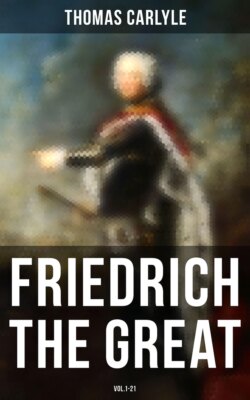Читать книгу Friedrich the Great (Vol.1-21) - Томас Карлейль - Страница 209
На сайте Литреса книга снята с продажи.
HIS MAJESTY'S BUILDING OPERATIONS.
ОглавлениеTable of Contents
"This year," says Fassmann, "the building operations both in Berlin and Stettin,"—in Stettin where new fortifications are completed, in Berlin where gradually whole new quarters are getting built—"were exceedingly pushed forward (AUSSERST POUSSIRT)." Alas, yes; this too is a questionable memorable feature of his Majesty's reign. Late Majesty, old King Friedrich I., wishful—as others had been, for the growth of Berlin, laid out a new Quarter, and called it Friedrichs Stadt; scraggy boggy ground, planned out into streets, Friedrichs Strasse the chief street, with here and there a house standing lonesomely prophetic on it. But it is this present Majesty, Friedrich Wilhelm, that gets the plan executed, and the Friedrichs Strasse actually built, not always in a soft or spontaneous manner. Friedrich Wilhelm was the AEdile of his Country, as well as the Drill-sergeant; Berlin City did not rise of its own accord, or on the principle of leave-alone, any more than the Prussian Army itself. Wreck and rubbish Friedrich Wilhelm will not leave alone, in any kind; but is intent by all chances to sweep them from the face of the Earth, that something useful, seemly to the Royal mind, may stand there instead. Hence these building operations in the Friedrich Street and elsewhere, so "exceedingly pushed forward."
The number of scraggy waste places he swept clear, first and last, and built tight human dwellings upon, is almost uncountable. A common gift from him (as from his Son after him) to a man in favor, was that of a new good House—an excellent gift. Or if the man is himself able to build, Majesty will help him, incite him: "Timber enough is in the royal forests; stone, lime are in the royal quarries; scraggy waste is abundant: why should any man, of the least industry or private capital, live in a bad house?" By degrees, the pressure of his Majesty upon private men to build with encouragement became considerable, became excessive, irresistible; and was much complained of, in these years now come. Old Colonel Derschau is the King's Agent, at Berlin, in this matter; a hard stiff man; squeezes men, all manner of men with the least capital, till they build.
Nussler, for example, whom we once saw at Hanover, managing a certain contested Heritage for Friedrich Wilhelm; adroit Nussler, though he has yet got no fixed appointment, nor pay except by the job, is urged to build;—second year hence, 1733, occurs the case of Nussler, and is copiously dwelt upon by Busching his biographer: "Build yourself a house in the Friedrichs Strasse!" urges Derschau. "But I have no pay, no capital!" pleads Nussler.—"Tush, your Father-in-law, abstruse Kanzler von Ludwig, in Halle University, monster of law-learning there, is not he a monster of hoarded moneys withal? He will lend you, for his own and his Daughter's sake. [Busching, Beitrage, i. 324.] Or shall his Majesty compel him?" urges Derschau. And slowly, continually turns the screw upon Nussler, till he too raises for himself a firm good house in the Friedrichs Stadt—Friedrichs Strasse, or STREET, as they now call it, which the Tourist of these days knows. Substantial clear ashlar Street, miles or half-miles long; straight as a line:—Friedrich Wilhelm found it scrag and quagmire; and left it what the Tourist sees, by these hard methods. Thus Herr Privy-Councillor Klinggraf too, Nussler's next neighbor: he did not want to build; far from it; but was obliged, on worse terms than Nussler. You have such work, founding your house;—for the Nussler-Klinggraf spot was a fish-pool, and "carps were dug up" in founding;—such piles, bound platform of solid beams; "4,000 thalers gone before the first stone is laid:" and, in fact, the house must be built honestly, or it will be worse for the house and you. "Cost me 12,000 thalers (1,800 pounds) in all, and is worth perhaps 2,000!" sorrowfully ejaculates Nussler, when the job is over. Still worse with Privy-Councillor Klinggraf: his house, the next to Nussler's, is worth mere nothing to him when built; a soap-boiler offers him 800 thalers (120 pounds) for it; and Nussler, to avoid suffocation, purchases it himself of Klinggraf for that sum. Derschau, with his slow screw-machinery, is very formidable;—and Busching knows it for a fact, "that respectable Berlin persons used to run out of the way of Burgermeister Koch and him, when either of them turned up on the streets!"
These things were heavy to bear. Truly, yes; where is the liberty of private capital or liberty of almost any kind, on those terms? Liberty to ANNIHILATE rubbish and chaos, under known conditions, you may have; but not the least liberty to keep them about you, though never so fond of doing it! What shall we say? Nussler and the Soap-boiler do both live in houses more human than they once had. Berlin itself, and some other things, did not spring from Free-trade. Berlin City would, to this day, have been a Place of SCRUBS ("the BERLIN," a mere appellative noun to that effect), had Free-trade always been the rule there. I am sorry his Majesty transgresses the limits;—and we, my friends, if we can make our Chaos into Cosmos by firing Parliamentary eloquence into it, and bombarding it with Blue-Books, we will much triumph over his Majesty, one day!—
Thus are the building operations exceedingly pushed forward, the Ear of Jenkins torn off, and Victor Amadeus locked in ward, while our Crown-Prince, in the eclipsed state, is inspected by a Sage in pipe-clay, and Wilhelmina's wedding is coming on.
